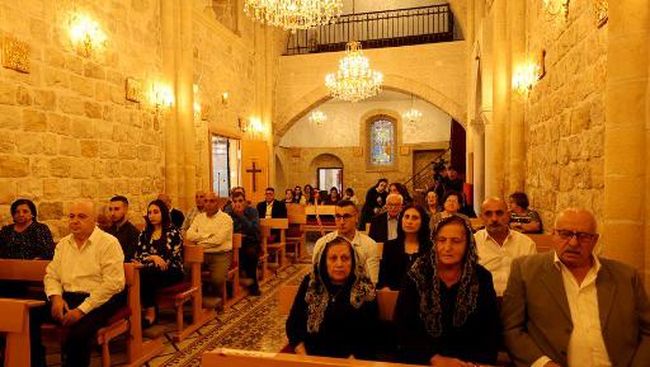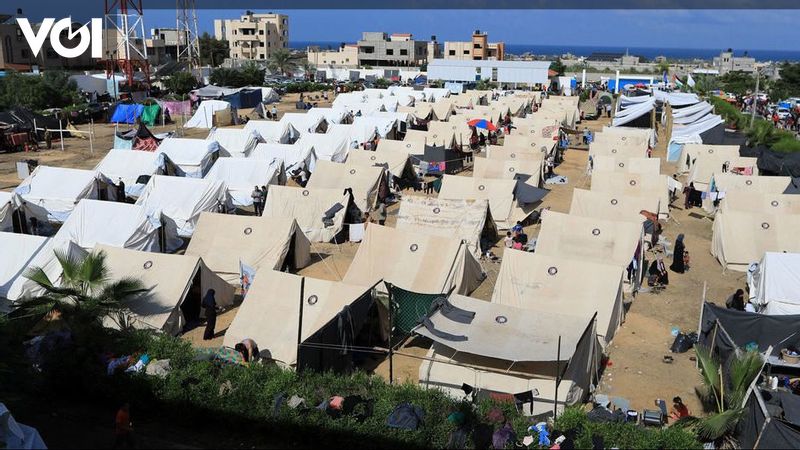International
Tommy Patrio SoronganCNBC Indonesia
News
Friday 10/11/2023 5:30 p.m. WIB
Jakarta, CNBC Indonesia – The Israeli attack on the Gaza region has had a major impact on the Christian community in the Palestinian enclave. In fact, they are on the verge of extinction.
When Israeli bombs began hitting the once-bustling streets of Gaza City, Diana Tarazi and her family fled to the Church of the Holy Family, the only Catholic place of worship in the Gaza Strip.
The 38-year-old Palestinian Christian, her husband and three children huddled together with other worshipers and Muslim neighbors and friends, putting their children sound asleep amid the sound of bombs, whispering soft words of encouragement to each other.
“Together we tried to get through the war until it ended and we survived,” Tarazi said. Al Jazeeraquoted Friday (10/11/2023).
Their sense of security was shattered on October 19, when Israel bombed St. Porphyrius Church, the oldest church in Gaza, killing at least 18 people. The Israeli military said in a statement that the church was not the target of the attack.
“The missile fell right on it,” Tarazi said of the Greek Orthodox site. “We don’t think the church wasn’t their target.”
Two days earlier, according to Palestinian health authorities, an explosion at Al-Ahli Arab Hospital – an Anglican institution located a few blocks away – killed and injured hundreds of people. Hamas blamed the explosion on an Israeli airstrike while Tel Aviv claimed the explosion was caused by a faulty rocket fired by Palestinian Islamic Jihad, an armed group based in Gaza.
Even though Gaza City and neighboring refugee camps were surrounded by Israeli ground forces and airstrikes hit the area, Tarazi refused to leave.
“We do not accept refugees from our country, our land and our church,” he stressed. “I will only leave the church in the grave.”
Number of Christians in Gaza
In the report Al Jazeera, there are currently 1,000 Christians in Gaza. This figure is down sharply from the 3,000 people recorded in 2007, when Hamas took full control of the enclave.
According to Saint Porphyry Church spokesperson Kamel Ayyad, the majority of Christians come from Gaza itself. The others are refugees who fled to the region after the establishment of the state of Israel, which displaced around 700,000 Palestinians in an event known as the Nakba, meaning “catastrophe.”
“The Hamas government implemented an Israeli-led land, air and sea blockade, accelerating the flight of Christians from the poverty-stricken enclave,” Ayyad said.
“It is very difficult for people to live here. Many Christians go to the West Bank, America, Canada or the Arab world, in search of better education and better health,” he said. he adds.
Gaza’s Christian residents themselves have a unique style as they often follow several Christian streams simultaneously. One of them is Fadi Salfiti, who attends all the churches.
“On Sunday morning we go to the Orthodox church, in the afternoon to the Catholic church and in the evening to the Protestant church,” he said.
Christian history of Gaza
The legacy of Christianity in Gaza dates back to a time when the religion was still a persecuted sect, promising salvation to the oppressed. In the Bible, after the crucifixion of Jesus Christ, the apostle Philip traveled the desert road from Jerusalem to Gaza to spread the good word.
According to Scripture, Philip was present at a wedding feast at Cana in Galilee. At that time, Jesus transformed water into wine.
Saint Porphyry Church is the oldest in the Gaza region. It was founded in the 5th century after the death of the eponymous bishop who converted the region’s inhabitants to Christianity.
After the Persian conquest in the 7th century, the church was transformed into a mosque. It was then rebuilt by the crusaders in the 12th century.
Palestinian Christians, who number 50,000 in the occupied territories, are sometimes described as “living stones”. This is a metaphor first used by Jesus’ disciple Peter to describe the role of believers in building God’s spiritual house.
Today, the term refers to their special status. They are often considered the guardians of the religion born on this earth.
(sef/sef)

“Professional communicator. General music practitioner. Passionate organizer. Evil twitter fan.”






